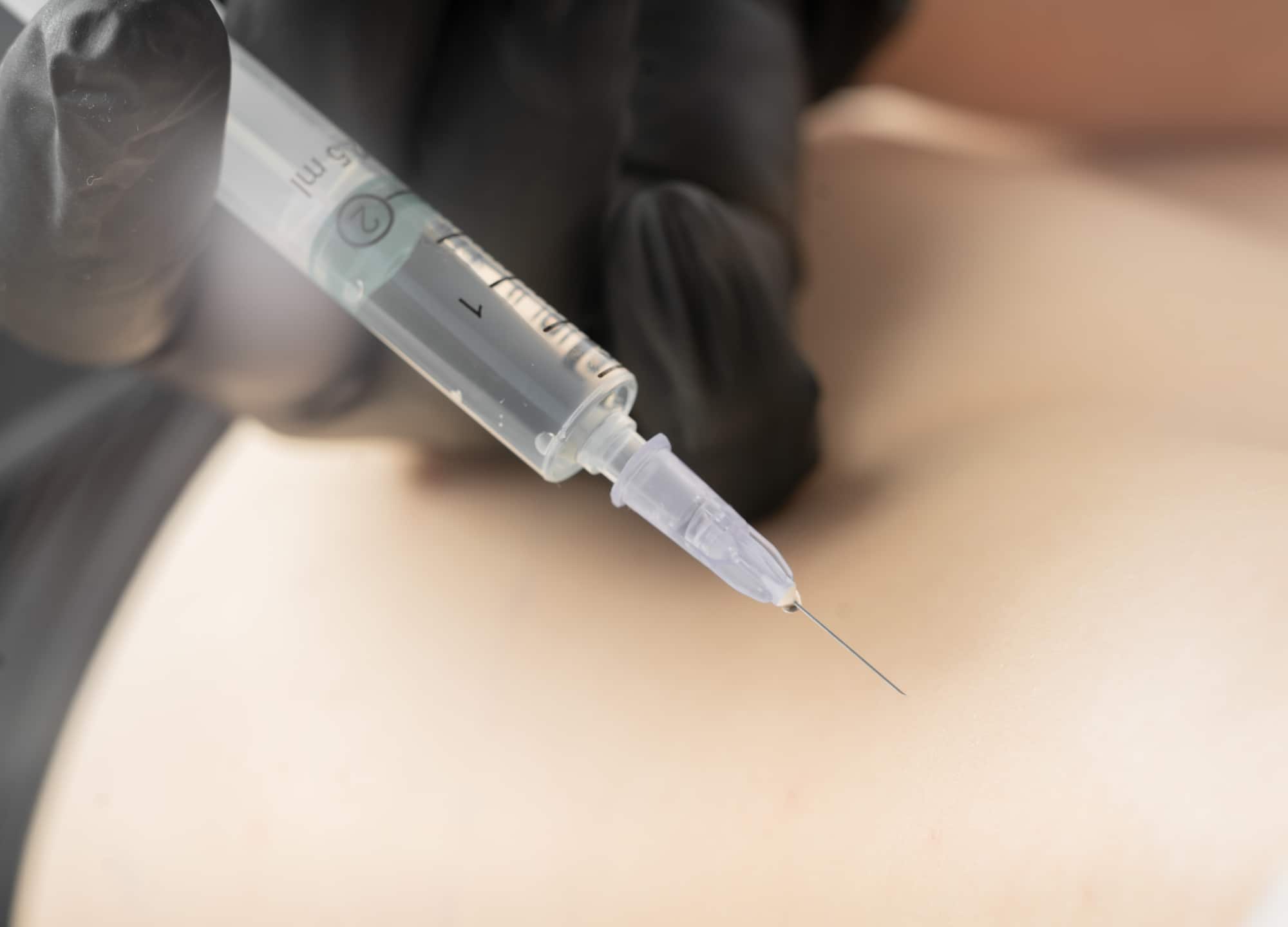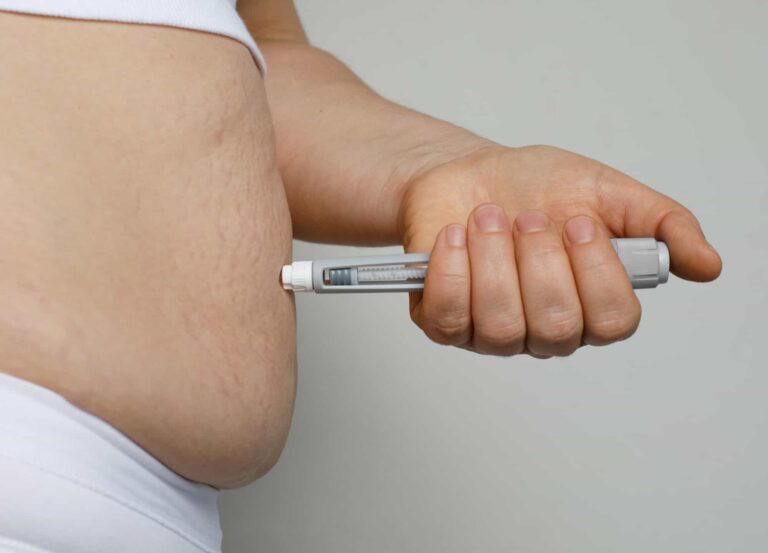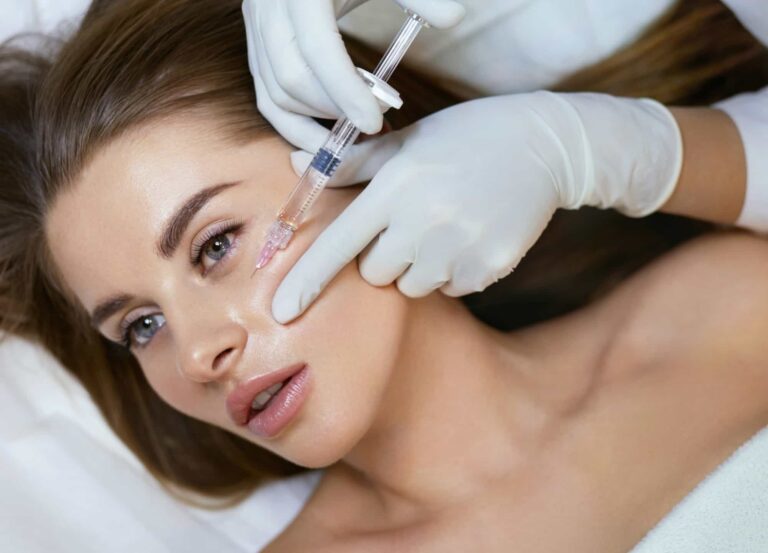Featured Experts
Dr. Tiffany Libby, a board-certified dermatologist in Riverside, Rhode Island
Dr. Jessie Cheung, a board-certified dermatologist in New York City and Chicago
Dr. Karan Lal, a board-certified dermatologist in Scottsdale, Arizona
In the current age of beauty and aesthetics, social media tends to be the first place consumers hear about the latest trends. Lately, fat-dissolving injections (aka injection lipolysis) have been gaining traction, especially those that are unregulated and available for purchase online. This trend has raised concerns among health experts, especially following a rise in reports of adverse reactions related to these treatments. In fact, the U.S. Food and Drug Administration (FDA) recently released a warning highlighting the dangers of fat-dissolving injections. Here, we break down what you need to know.
What are fat-dissolving injections?
According to Dr. Tiffany Libby, a board-certified dermatologist in Riverside, Rhode Island, injection lipolysis is a nonsurgical treatment in which a bile salt–based ingredient is injected into the fat with the aim of disrupting the fat cell membranes, to permanently break down and reduce excess fat.
Deoxycholic acid, which is available under the brand name Kybella, is the only fat-dissolving injectable drug that is FDA approved to reduce chin fat in adults. (The FDA has evaluated this medication only for use under the chin; use of it on other areas of the body, like the stomach, is considered off label.)
Unregulated fat-dissolving injections (i.e., those that have not been approved by the FDA or evaluated for quality, safety, and effectiveness) are being marketed and sold under a variety of brand names, the most common being Aqualyx, Lipodissolve, Lipo Lab, and Kabelline. The manufacturers of these injectables claim that they can be used to dissolve fat deposits in areas such as the stomach, upper arms, thighs, back, and chin.
@kellykilleenmd #kybella #lipolab #lipodissolve #medtok #lemonbottle #greenscreen ♬ original sound – Kelly Killeen, MD, FACS
Common ingredients used in these treatments include phosphatidylcholine (PPC) and sodium deoxycholate (DC), and the procedure is often referred to as “PCDC injections.” According to Dr. Jessie Cheung, a board-certified dermatologist in Chicago and New York City, these two ingredients work together to rupture and cause death of fat cells, through processes called lipolysis and apoptosis.
Another product that has gained traction on TikTok, with more than 50 million views and counting, is Lemon Bottle, a fat-dissolving injectable manufactured in Korea. This product contains bromelain, riboflavin (vitamin B2), and lecithin. “This product is not FDA approved, and because it does not contain the industry standard, deoxycholic acid, it is classified as a cosmetic, not a medication, and is therefore not regulated,” says Dr. Libby.
This is a fat-dissolving injection that users are purchasing and self-injecting at home into various areas of their faces and bodies. Many are seeking guidance from one another—versus seeking out trained medical providers for treatment—regarding injection techniques. For example, one Reddit user asks, “Where would one buy the necessary needles, also, how would one know how to inject it?” Another asks, “Hi, could you share how deep you inject (mm) to reach the subcutaneous fat layer? And how do you know you’re hitting that exact depth?”
Dr. Karan Lal, a board certified dermatologist in Scottsdale, Arizona, adds that “there are no scientific claims that it dissolves fat in the body” and says he would never consider injecting this, especially since issues of sterility arise. He voices concern that it’s unclear what this treatment can do to the body, such as causing localized lumps, inflammatory reactions, and even potential destruction of the skin.
Several people who have used this treatment have reported adverse effects online. One individual on Reddit described severe muscle pain following injection of Lemon Bottle into the arm, possibly into the bicep. Other concerning symptoms such as swelling, pain, and tissue hardness have also been reported.
Safety concerns regarding fat-dissolving injectables on the market
These products have not been cleared or approved by the FDA, and as such, their safety and effectiveness have not been thoroughly investigated. In fact, these injectables have been associated with severe adverse reactions, including permanent scars, serious infections, and skin deformities.
Adverse effects have been increasingly reported among individuals who received these injections at clinics or med spas by untrained and unlicensed providers. Others have purchased these treatments online and dangerously self-administered the injections. For example, this report highlights a case in which Aqualyx was not administered by a trained health professional and was injected too superficially, resulting in localized skin necrosis.
The recent FDA warning provides an example of a woman who experienced multiple infected knots on the upper arm following fat-dissolving injections, with persistent scarring after two months of antibiotic treatment. “Fat is part of many important tissues such as nerves,” says Dr. Lal. “Getting treatment at a med spa by a non-dermatologist or plastic surgeon could put you at risk for nerve injury.”
Regarding the safety of Lemon Bottle, Dr. Cheung highlights that there are no clinical studies that have been done on humans with injected bromelain. “That means we have no idea of the dose that is toxic, much less safe or effective for fat reduction. As bromelain breaks down protein, we don’t know the extent of its effects on our muscles if injected too deep, or if it can break down the collagen in our skin if injected too superficially.” She further explains that a trained injector will be able to detect the proper depth of injection to target unwanted fat and maintain a sterile technique, but “it would be difficult to find anyone who would risk their medical license with this product.”
There are many dangers in receiving these injections, either at a med spa by untrained personnel or through self-injections at home. “[In my practice,] we are seeing these complications play out as this viral trend continues. The complications range from infections to cysts and scarring,” says Dr. Libby. Many of these complications could even require hospitalization. In addition, the placement of injections, positioning of the needle, and technique of the injector can all contribute to the heightened possibility of these adverse events.
Both the FDA and board-certified dermatologists strongly advise against acquiring these fat-dissolving injections and self-administering them at home or receiving them from a med spa. For those who have received these injections and are experiencing side effects, it’s important to talk to your healthcare provider and submit a report online.
What to know before visiting a med spa for injection lipolysis
First and foremost, you need to understand who is performing your cosmetic procedure. Ask for the credentials of your injector and their experience, not only in this particular procedure but in handling complications that may arise. Dr. Libby references a recent study published in the journal Dermatologic Surgery, highlighting that 63% of medical spas are owned by non-medical doctors. Of those owned by MDs, 80% of those doctors have non-core aesthetic specialties, meaning a specialty other than dermatology, plastic surgery, ophthalmology, or otorhinolaryngology).
Here are few questions you should ask before undergoing a treatment:
- Who is performing the procedures? While regulations differ across states, it’s essential to ensure that a licensed medical professional is directly involved in your care.
- Is a physician involved? It’s preferable to choose a med spa owned, operated, or supervised by a medical doctor who specializes in cosmetics. Especially in the case of an emergency, it’s essential to have a doctor present.
- What products are being used? Verify that only FDA-approved medications are administered under sterile conditions. Remember: in the case of injection lipolysis, only Kybella is approved and regulated.
- Is the facility clean? Observe staff practices, such as wiping surfaces and using antibacterial sprays, to ensure hygienic standards are upheld. Ensure that your provider is wearing gloves.
The bottom line
Even though noninvasive cosmetic procedures don’t involve surgery, this doesn’t mean they aren’t risky. It can be easy to be swayed by the variety of products marketed and sold online, enticing deals for cosmetic procedures at med spas, and online communities that minimize risks and difficulty. But if dermatologists, who have at least 12 years of education and training under their belt, don’t feel comfortable using unregulated injection lipolysis products on themselves or their patients, neither should you.











